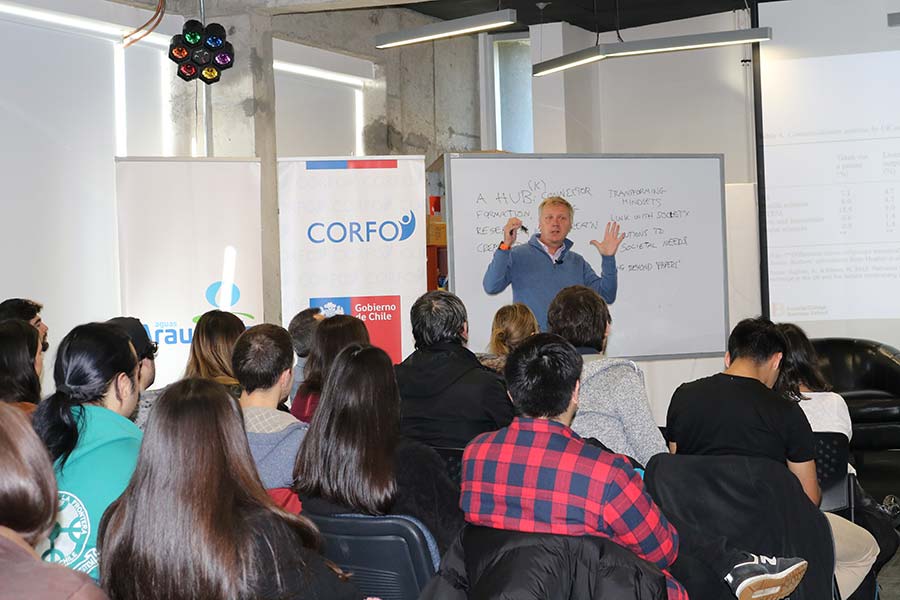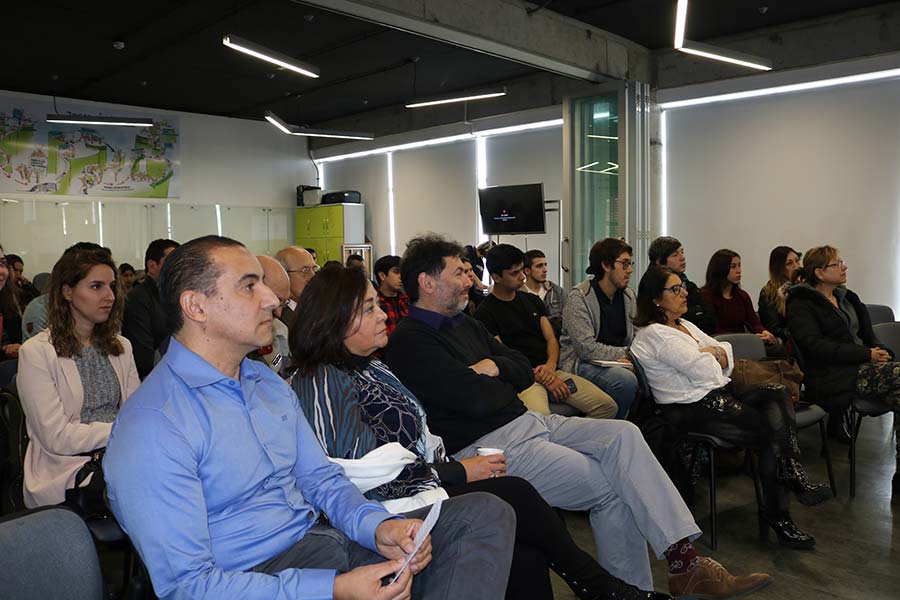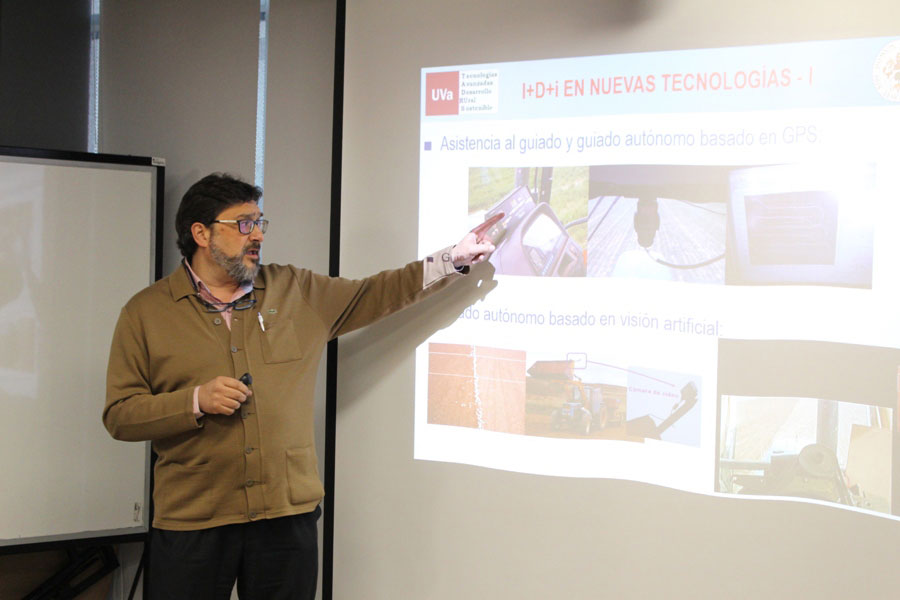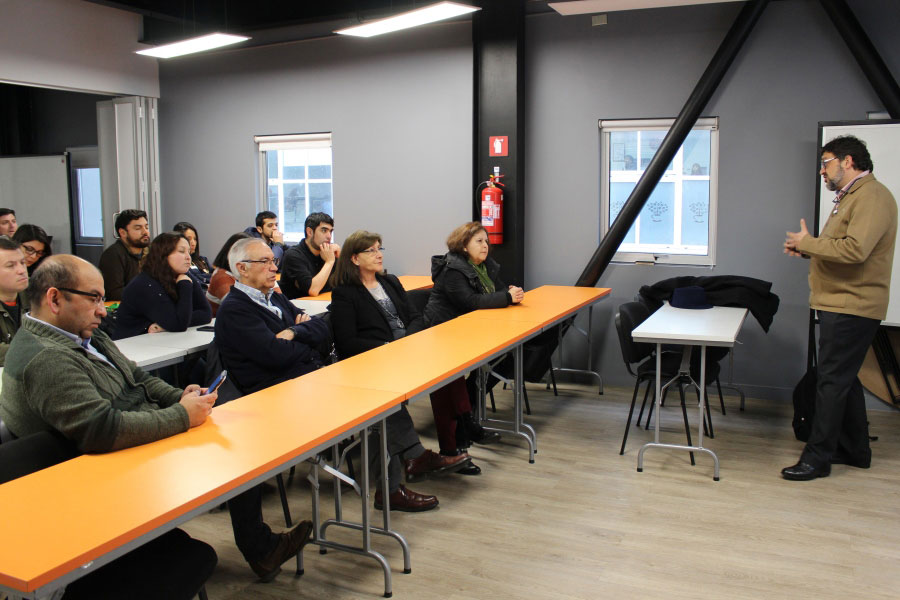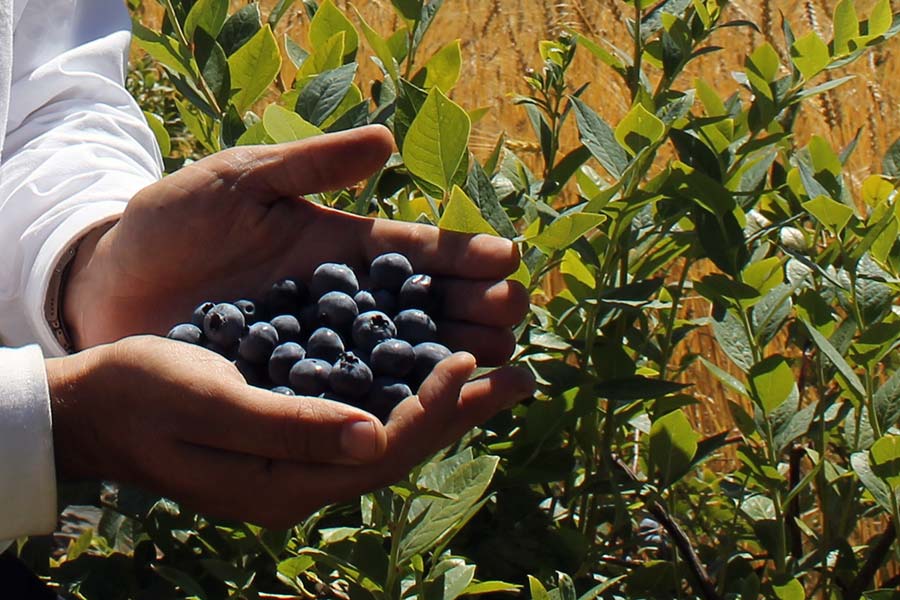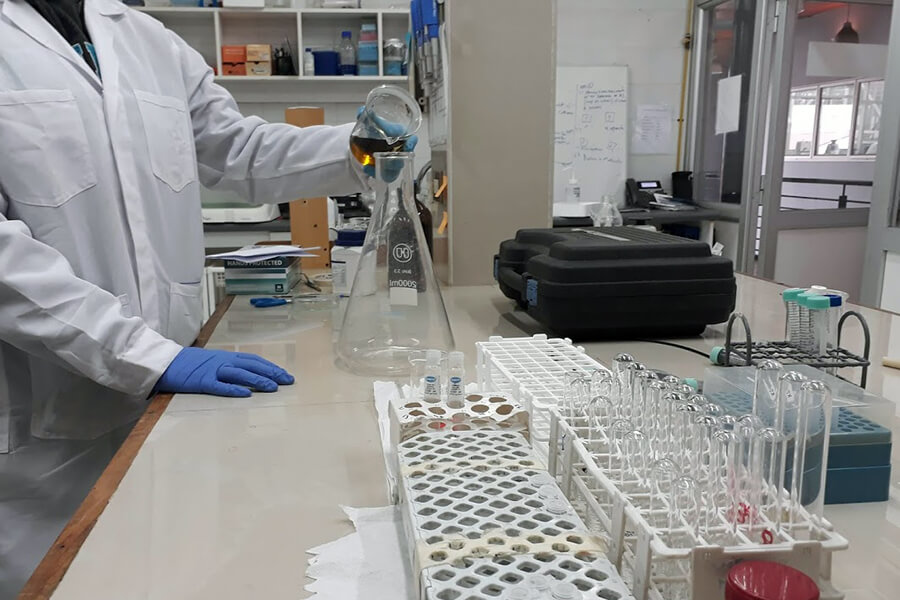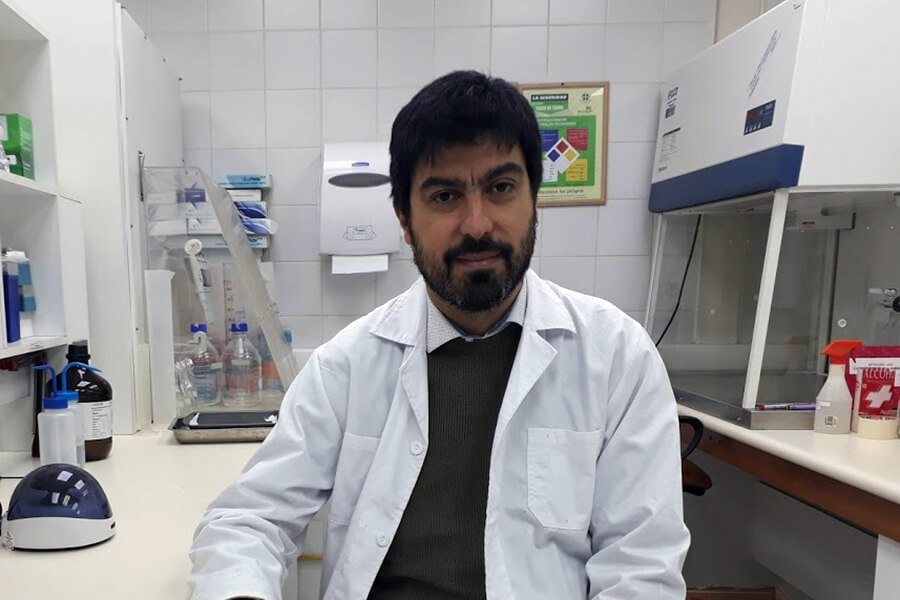|
The attendance and participation marked the seminar at the UFRO, which left the message that entrepreneurial capacities arise when individuals and organizations decide to confront the risks and to make the leap. |
With the idea to respond to the questions of the local and regional audience, university members and the ones interested in making the leap from investigation to science, the Institute IDEA-UFRO of the Universidad de La Frontera (UFRO) invited a world-class expert to share his knowledge. Erkko Autio is renowned as one of the 50 professors with most influence in global management. He was the main speaker at the seminar “Science for Innovation”, which the UFRO carried out. To learn about the environment of innovation with experiences that transform and stimulate inspiration, knowledge and actions – these are some of the objectives with which the Institute IDEA-UFRO has been disseminating its activities in 2019, besides of the big projects and initiatives for the promotion of an entrepreneurial spirit and collaborative learning. During the seminar, the Chair in Technology Transfer and Entrepreneurship at Imperial College London Business School – one of the institutions with most influence in London regarding the creation of hubs for innovation and entrepreneurship, which are capable of converting the cities they are located in into leading innovation centers – addressed how it is possible to generate a significant impact of social relevance through research. In this context, Autio emphasized the privileged position of universities and technical centers (such as recruiters, knowledge-creators, and also creators of spaces for cooperation) and addressed issues of the studies focused on digitalization and the impact on the ecosystems of innovation, in the internationalization of companies and the creation of new business models. “Digitalization is basically changing everything. It is transforming how value is created in society, and how therefore societies should organize for value creation. And it is transforming the process of entrepreneurial opportunity discovery and pursue,” he said. In a promotional video that was disseminated by IDEA-UFRO for the promotion of the event, the professor explains how the Imperial College London Business School has been dealing with the big global challenges, aspects that are essential in the development of innovation and entrepreneurship, and explained: “Imperial picks mayor global challenges and then tries to resolve them. Only then does it bring in academic disciplines. There is a big focus on climate change, global health, global energy systems, digitalization, and so on. This is very different from many other places, where the academic discipline is the starting point.”
 Written by: UFRO Communications Office Written by: UFRO Communications OfficeThis email address is being protected from spambots. You need JavaScript enabled to view it. |
|
The project contemplates the creation of an international research consortium. The UFRO will be in charge of the southern node in Chile. |
“Territories of response” is the name of the Horizon 2020 project that has just been awarded to the research group on culture and territory at the Social Science Nucleus of the Universidad de La Frontera (UFRO) and the Center of International Research of the Patagonia (CIEPatagonia). The initiative will bring theoretical and empirical knowledge about alternative models of development that challenge the traditional schemes and that tend to create sustainable and resilient environments. It is an emerging field of research in the world that focuses on the value of territorial knowledge and on how it provides different points of view regarding social organization, responding to the dominant hegemonic model. “The spaces of response are organized in a non-traditional manner, establishing communities that see the world in a different way, and implementing, for example, different pedagogical practices or relationships with nature from a new perspective,” Dr. Hugo Zunino, the director of the UFRO node of the consortium explained. The project includes the formation of an international research consortium, comprised of the University of Leeds (UK), University of Sheffield (UK), Autonomous University of Madrid (Universidad Autónoma de Madrid) in Spain, Polytechnic University of Milan (Politecnico di Milano) in Italy, Free University of Berlin (Freie Universität Berlin) in Germany, University of Buenos Aires (Universidad de Buenos Aires) in Argentina, University of San Andrés (Universidad de San Andrés) in Bolivia, Pontifical Xavierian University (Pontificia Universidad Javeriana) in Colombia, Latin American Faculty for Social Sciences (Ecuador), University of Chile and the Universidad de La Frontera. VERTICAL KNOWLEDGE “The first thing we are going to do is to find out where these spaces of response are and to get to know their people. This study is going to be ethnographic. We will be involved in the daily life of these groups,” the researcher clarified. Afterwards, the process of documentation and dissemination will begin through social and artistic expressions. The discussion will also be taken to the academy, responding to the traditional way of knowledge creation. “We are revealing, emphasizing and enhancing local knowledge, the experiences of daily life, the different ways to think about urban and rural development, to think about our relationship with nature and other people. We are addressing the Cartesian and Kantian model, we are discussing with this vertical knowledge, overcoming the invisibilization of the human being in modern science,” Dr. Zunino added. The researchers are currently in the phase of planning the activities of this project, which will have a duration of two years. The aspiration is to establish a research field within the universities, and particularly at the Universidad de La Frontera, that focuses on the spaces of response, revealing the value of territorial knowledge and its contribution to sustainability and resilience.
Written by: Karimme Riadi
Vice-rectorate for Research and Graduate Studies |
|
Dr. Luis Manuel Navas was pleasantly surprised by the work and the possibilities of cooperation between both universities. |
Scientists of the Universidad de La Frontera (UFRO) organized a seminar and invited Dr. Luis Manuel Navas, an academic of the University of Valladolid (UVa) in Spain, with the intention of strengthening the partnership and international scientific cooperation. In order to display the options of joint research lines, the Research Center for Mycorrhizae and Agro-environmental Sustainability (CIMYSA) and the Center of Excellence in Biotechnological Research applied to the Environment (CIBAMA), both part of the Faculty of Engineering and Science of the UFRO, presented their work in the seminar, as well as the Recognized Research Group on Advanced Technologies for Sustainable Rural Development (GIR-TADRUS), which is coordinated by Dr. Navas at UVa. This is the first time that the expert in agricultural engineering came to the UFRO and he was pleasantly surprised by the work and the possibilities of cooperation between these three centers. “This university made a real good impression on me regarding its work in the fields related to the ones we are working on. Sciences; agricultural, agroforestry and agri-food engineering, amongst others – these are the fields in which I guess that we could move forward together, for example in the development of R&D, which we are all interested in,” Dr. Navas pointed out. Dr. Navas has been invited by Dr. Pablo Cornejo, the director of CIMYSA, and was able to learn about the different research initiatives of the UFRO, as well as to establish contact with academic researchers. His visit lasted five days and was part of the Erasmus+ Project KA107. For the near future, the researcher of UVa envisions topics associated with the environment as a joint field of action. He explained: “In Chile, as well as in Spain, we are having the same situation, the same problems and environmental impact. Therefore, what unites us is the possibility to try find scientific and technological solutions to those problems together.” It is worth mentioning that the alliance of these two centers of the UFRO Faculty of Engineering and Science with the Recognized Research Group on Advanced Technologies for Sustainable Rural Development is one of the dissemination activities of the project CONICYT/FONDAP/15130015, which is carried out by the Water Research Center for Agriculture and Mining (CRHIAM), and which the UFRO is a partner institution of.
 Written by: Daphne Bormann Parada Written by: Daphne Bormann ParadaFaculty of Engineering and Science |
|
The congress will include the participation of invited speakers from the United States, Switzerland, Bolivia, Argentina, Spain, Uruguay and Chile. |
On October 17 and 18, 2019, the Universidad de La Frontera (UFRO) will host the first Congress on Agroecology in Chile at its Pucon Campus. It is organized by the UFRO and the Chilean Division of the Latin American Scientific Society of Agroecology (SOCLA-Chile). At the UFRO, the Laboratory of Agroecology and Alimentary Sustainability of the UFRO Faculty of Agricultural and Forestry Science is the main organizing unit for this event that seeks to open a space to meet and share knowledge on agroecology from different perspectives and fields of action: science/academics; specialists/professionals; agriculture/farmers; and politics/activists. The participants and invited speakers from the United States, Switzerland, Bolivia, Argentina, Spain, Uruguay and Chile will come together under the motto “Agroecology: transcending practices towards food sustainability” and there will also be an exposition of posters, oral presentations, symposia and workshops on different issues in the field: agroecological practices and management; rural and food policies and development; feminism and social movements; agricultural/food systems; society and environment; and agroecosystems and ecosystem services. Dr. Rene Montalba, the chairman of the Organizing Committee, pointed out that this congress is meant to be slightly different compared to the classic disciplinary scientific meetings: “The very nature of Agroecology are disciplines, such as: transdisciplinary critical science; sustainable technical and productive proposals; and agrarian, food social movements. This converts it into a space of scientific confluence, where the most varied disciplines, fields and kinds of knowledge meet; agricultural producers of different levels and professionals who are linked to food production, distribution and/or consumption; decision makers of different organizations, as well as politicians and activists linked to social movements or agrarian and food processes.” OPEN COURSES As part of the congress, the UFRO is going to offer two open courses open to the general public (vacancies limited). The first one is about “Agroecology and Sustainable Food” and will take place on October 15 and 16 at the UFRO Faculty of Agricultural and Forestry Science in Temuco, Chile. The second one is about “Design, Implementation and Management of Agroecological Lighthouses for the dissemination of Sustainable Agricultural Systems” and will take place on October 16 at the Center for Education and Technology – CET Bío Bío in Yumbel, Chile. After these courses, transportation to Pucon Campus of the UFRO will be available for the participants of the congress. For more information or consultations, please contact This email address is being protected from spambots. You need JavaScript enabled to view it. or enter agroecologia.ufro.cl.  Written by: UFRO Communications Office Written by: UFRO Communications OfficeThis email address is being protected from spambots. You need JavaScript enabled to view it. |
|
Only 1% of the olive oil production wastes are reused, a situation that is an environmental problem in the agricultural sector at the international level. |
In ten years, the olive oil production in Chile grew 521%, producing annually between 17,500 and 21,000 tons of this rich food. It is a very positive scenery form the economic point of view, but not from the environmental point of view, since these processes generate about 157,500 tons of waste, which are not as easy to degrade as one might think. “In the field of agriculture, this kind of waste is the most complex,” Dr. Gustavo Ciudad, a researcher at the Universidad de La Frontera (UFRO) and the director of the Institute of the Environment, commented. This is why he is carrying out a Fondecyt (National Fund for Scientific and Technological Development) project, in order to treat this kind of waste with biotechnology and to use it for energy purposes. “An olive contains about 15% of oil. Through the best engineering process 10% can be extracted by press, unfortunately, the rest is waste, since it is a mixture of liquid, with parts of the seed, pulp and skin. The problem is that these wastes are phytotoxic, they affect the plants, and they also have a high content of recalcitrant organic matter. That means that it is difficult to biodegrade. This is where the first problems start, because they also accumulate in the same industry,” the researcher explained. THE IDEA The project contemplates the treatment of this complex alperujo in three stages. The first step is the pretreatment with fungi in order to increase its biodegradability. After that, the phase of anaerobic digestion starts, in order to rescue some of its energy value. And finally, it will be tested in soils. “The idea is to use white rot fungi that degrade lignocellulosic compounds and alperujo is rich in lignocellulosics, a composition that makes it difficult to degrade. Once the waste is partially biodegradable, we will turn over to a stage of anaerobic digestion that will transform it into another product, which is the digestate, also known as stabilized organic matter. This matter is rich in nutrients and can be applied to the soil,” Dr. Ciudad explained. The studies on this issue are being carried out at the laboratories of the Scientific and Technological Bioresource Nucleus (BIOREN-UFRO) and at the Institute of the Environment at the Universidad de La Frontera. One of the main analyses in this stage is to find alternatives for the acceleration of these processes, especially for those with fungi, which require a huge amount of time. The UFRO researchers who are participating in this study are Dr. Olga Rubilar, Dr. Cledir Santos and Dr. Alejandra Ribera. And also conversations with the Chilean Olive Oil Producers Association, called “Chile Oliva”, which brings the biggest olive oil producers in the country together, and with the Processed Food Studies Center (CEAP) of the University of Talca (Chile), which is located in the largest olive oil production zone in Chile, have started. At the same time, the project includes the participation of two researchers from Spain who are experts on this issue: Dr. Raul Muñoz of the University of Valladolid, who is an expert in projects on biotechnology and who was elected the researcher of the year in Spain in 2018; and Dr. Juan Miguel Romero García of the University of Jaén, who is working in direct contact with the olive oil producers in Andalusia, where the leading producers of Spain are located. INTERNATIONAL CONCERN In fact, this issue does not only concern the Chilean industry. It is also a global issue, especially in Europe, where several processes have been tested, but the technology could not be sufficiently developed, yet. One example is the anaerobic co-digestion, which consists of mixing the alperujo with other biodegradable matters, or thermal processes, which can get complicated because of the density of the waste. In this regard, this project proposes to do the procedure in wet conditions, directly in the alperujo and without the need to dry it. “And although this project is aimed at solving the problems that the Chilean industry currently has, with small companies, the results can be projected on an even larger scale,” concluded the researcher, whose project was in fourth place at the national level regarding the Regular Fondecyt projects awarded in 2018.
 Written by: Karimme Riadi Millas Written by: Karimme Riadi MillasUFRO Vice-rectorate for Research and Graduate Studies |





